Unit1Playing Sports Topic 2 I'll kick you the ball again S ectionA课件(共49张PPT) 仁爱版英语八年级上册
文档属性
| 名称 | Unit1Playing Sports Topic 2 I'll kick you the ball again S ectionA课件(共49张PPT) 仁爱版英语八年级上册 |
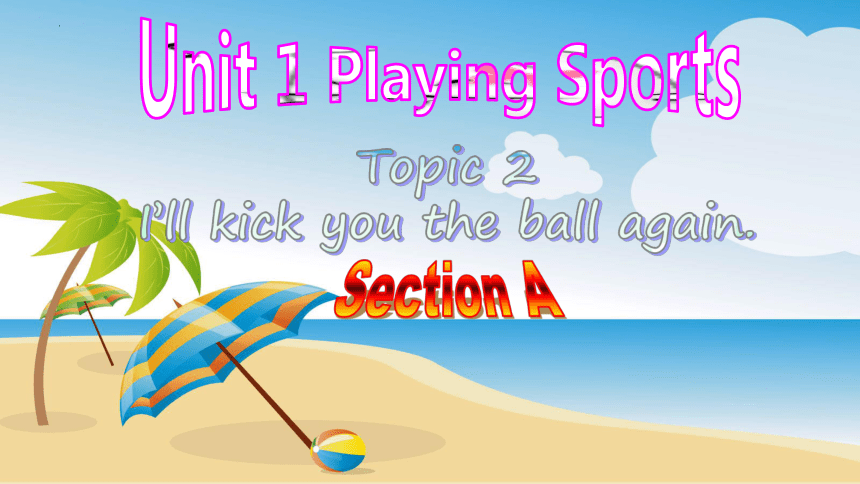
|
|
| 格式 | pptx | ||
| 文件大小 | 2.7MB | ||
| 资源类型 | 教案 | ||
| 版本资源 | 仁爱科普版 | ||
| 科目 | 英语 | ||
| 更新时间 | 2024-02-13 00:00:00 | ||
图片预览

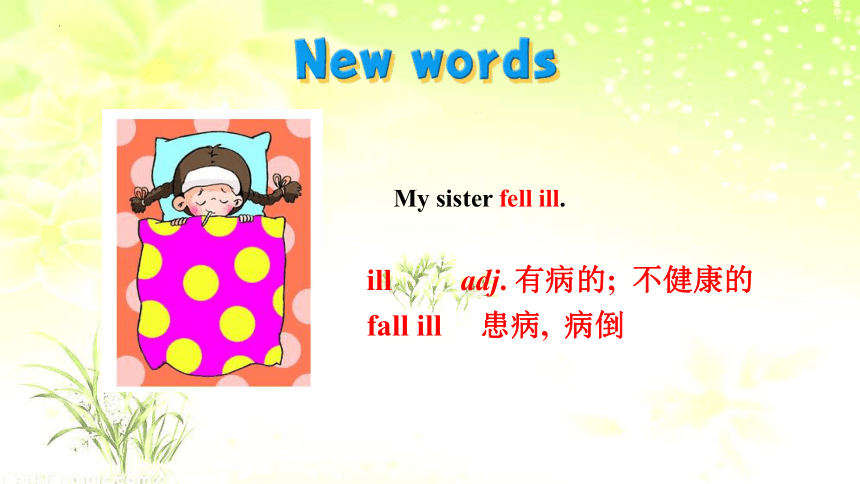
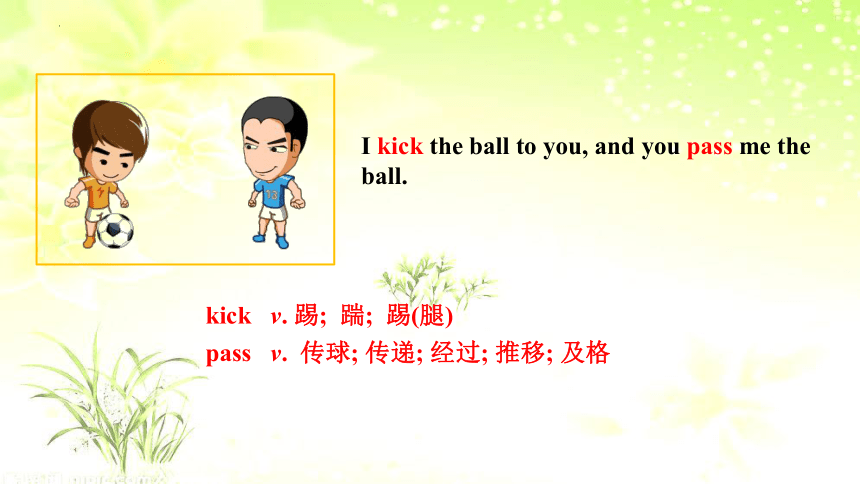
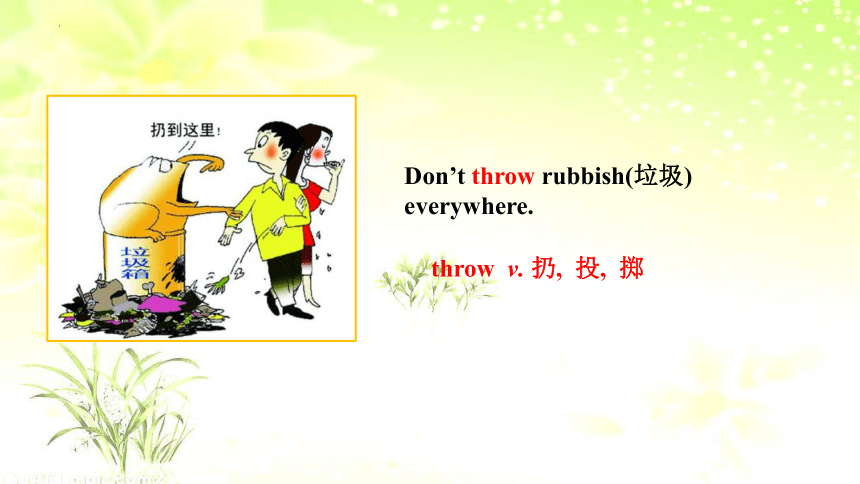
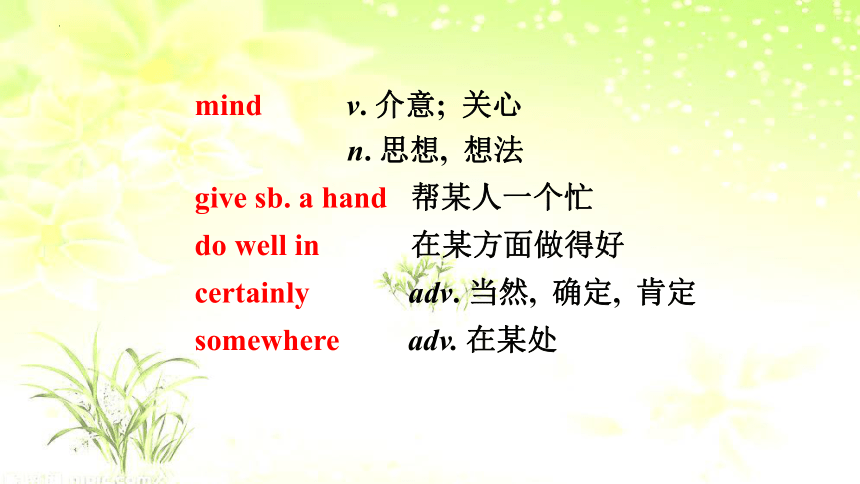
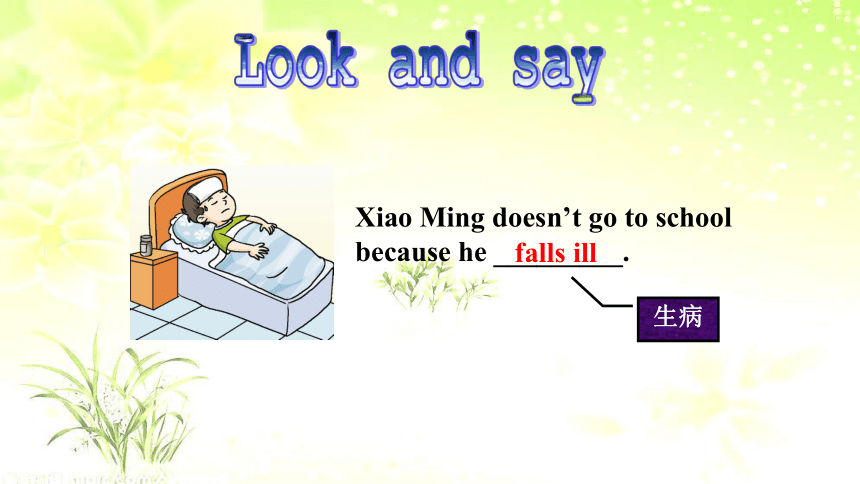
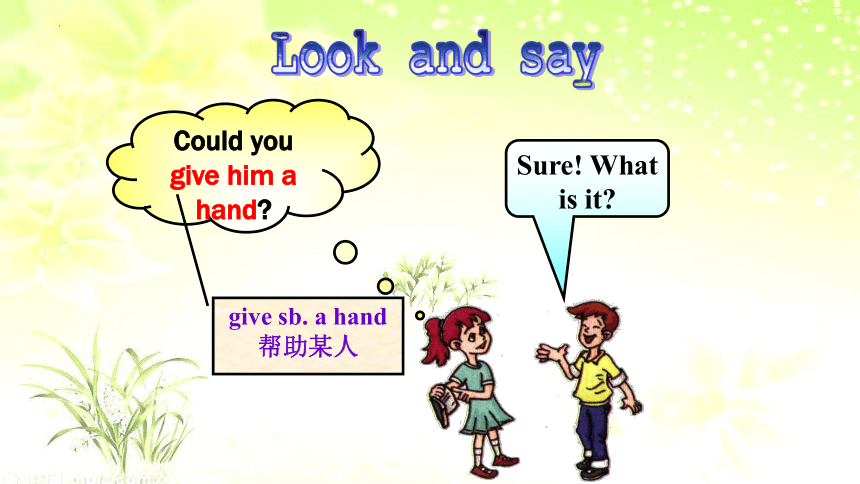
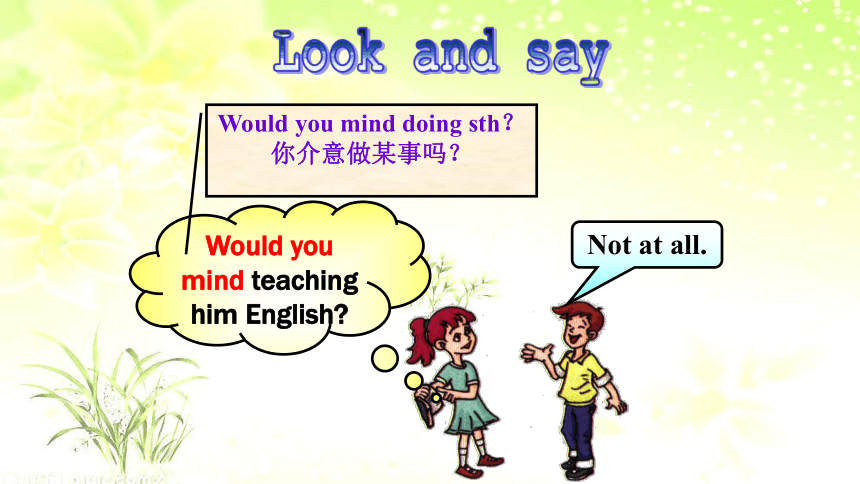
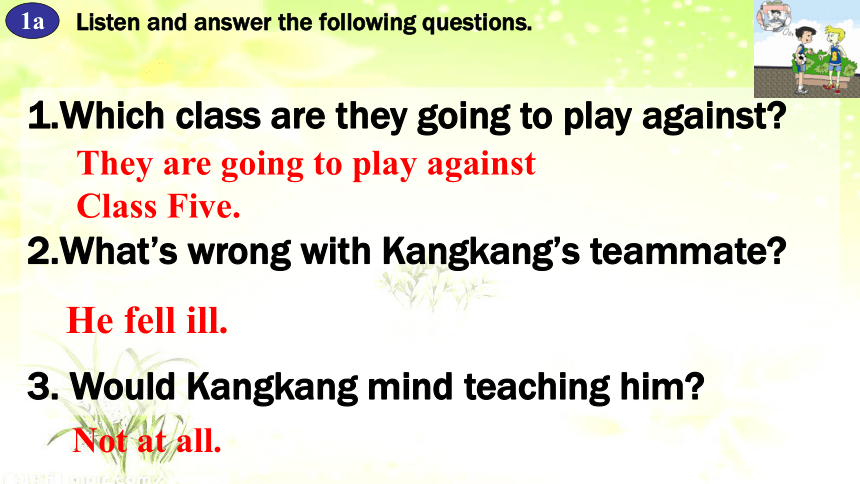
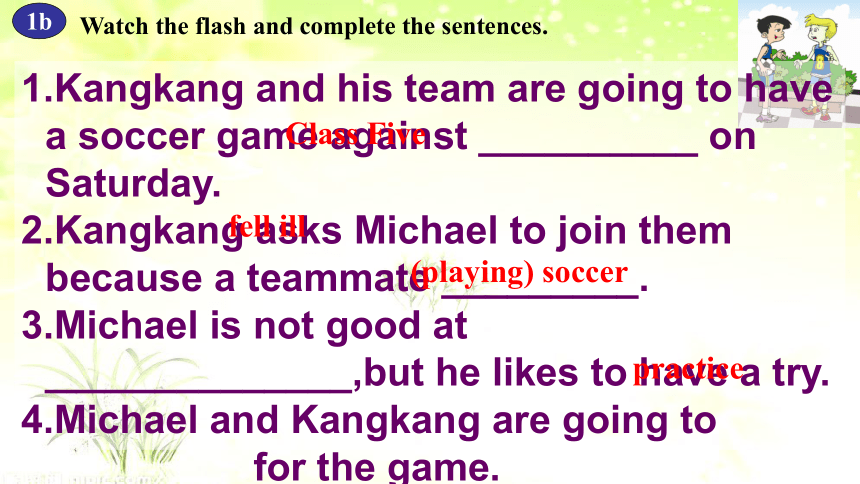
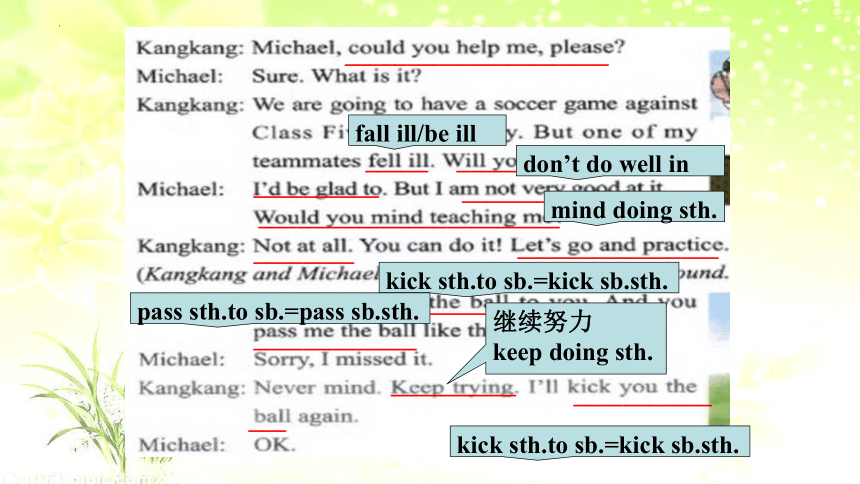
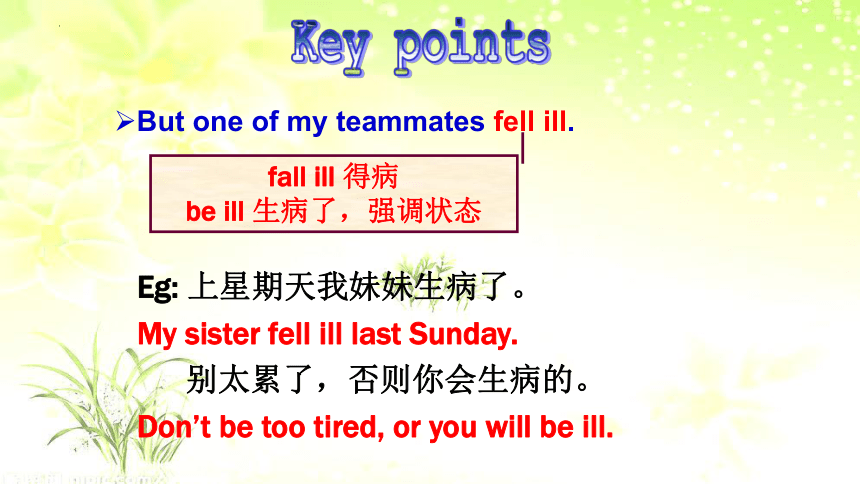
文档简介
(共49张PPT)
Unit 1 Playing Sports
Topic 2
I’ll kick you the ball again.
Section A
ill adj. 有病的; 不健康的
fall ill 患病, 病倒
My sister fell ill.
kick v. 踢; 踹; 踢(腿)
pass v. 传球; 传递; 经过; 推移; 及格
I kick the ball to you, and you pass me the ball.
throw v. 扔, 投, 掷
Don’t throw rubbish(垃圾) everywhere.
mind v. 介意; 关心
n. 思想, 想法
give sb. a hand 帮某人一个忙
do well in 在某方面做得好
certainly adv. 当然, 确定, 肯定
somewhere adv. 在某处
Look and say
Xiao Ming doesn’t go to school because he _________.
falls ill
生病
Look and say
Could you give him a hand
Sure! What is it
give sb. a hand 帮助某人
Would you mind teaching him English
Not at all.
Look and say
Would you mind doing sth? 你介意做某事吗?
Listen and answer the following questions.
Which class are they going to play against
What’s wrong with Kangkang’s teammate
3. Would Kangkang mind teaching him
They are going to play against Class Five.
He fell ill.
Not at all.
1a
Watch the flash and complete the sentences.
1b
Kangkang and his team are going to have a soccer game against __________ on Saturday.
Kangkang asks Michael to join them because a teammate _________.
Michael is not good at ______________,but he likes to have a try.
Michael and Kangkang are going to _________ for the game.
Class Five
fell ill
(playing) soccer
practice
_____________________
_____
fall ill/be ill
____________
__________
______________
don’t do well in
________________________
mind doing sth.
________
________________
________________
kick sth.to sb.=kick sb.sth.
_____________
pass sth.to sb.=pass sb.sth.
kick sth.to sb.=kick sb.sth.
__________
继续努力
keep doing sth.
___________
___
Key points
But one of my teammates fell ill.
fall ill 得病
be ill 生病了,强调状态
Eg: 上星期天我妹妹生病了。
My sister fell ill last Sunday.
别太累了,否则你会生病的。
Don’t be too tired, or you will be ill.
1. Could you (please) ... “请你……好吗?”
表示请求对方做某事
肯定回答: Yes, sure. / Sure. / Yes, I can.等
否定回答: Sorry, I can’t. I have to ... / No, I can’t. 等
e.g. —Could you (please) help to repair the bicycle
—Yes, sure.
—Could you (please) go to the movie with me this evening
—Sorry, I can’t. I have to prepare for my English exam.
Could you (please) ... 的否定形式是在please后面加not。
e.g. Could you please not turn on the TV
Could I / We ... “我 / 我们可以……吗 ”
表示请求得到对方的许可, 其答语比较灵活
肯定回答: Yes, you can. / Of course. / Sure.等
否定回答: Sorry. / No, you can’t.等
e.g. —Could we go for a picnic this weekend
—Yes, you can. But you have to finish your homework first.
—Could I borrow your pen
—No, you can’t.
【语境应用】根据汉语意思完成英语句子或对话, 每空一词。
1) 请你清扫一下地板好吗?
___________ ___________ ___________ ___________ the floor
2) 请你不要在楼道里跑好吗?
___________ ___________ ___________ ___________ ___________ in the hallways
3) —我现在可以看电视吗?
—是的,你可以。
—___________ ___________ ___________ TV now
—Yes, ___________ ___________.
Could I watch
Could you please sweep
Could you please not
run
you can
Key points
Would you mind teaching me
Would you mind doing sth.? 你介意做某事吗?
Would you mind not doing sth. 你介意不要做某事吗?
Eg: 你介意不要在这里吸烟吗?
Would you mind not smoking here
你介意把窗户打开吗?
Would you mind opening the window
2. Would you mind ...
你介意……吗 /请你干……好吗?
是交际用语中常用的句型之一
【归纳】
Would you mind + v.-ing形式
e.g. Would you mind cleaning your room now
Would you mind + if引导的从句
e.g. Would you mind if I sit here
Would you mind not + v.-ing形式 “请不要……好吗 ”
e.g. Would you mind not playing music now The baby is sleeping.
Would you mind +人称代词宾格或形容词性物主代词+ v.-ing形式 “你介意某人做某事吗?”
e.g. Would you mind me / my opening the window
对句型Would you mind ... 回答时,如果表示不介意,可用Certainly not / Of course not / Not at all等回答;如果表示介意,常用I’m sorry, but ... / You’d better not等回答。
e.g. —Would you mind helping me with the heavy box
—Of course not. / Certainly not. / Not at all.
—I’m sorry, but I’m quite busy now.
【语境应用】根据汉语意思完成英语对话,每空一词。
1) —你介意帮我做晚饭吗?
—当然不介意。
—_______ _______ _______ ________ me cook dinner
—________ ________ ________.
2) —请不要把你的衣服放在沙发上,好吗?
—对不起,我这就把它们收起来。
—________ ________ ________ ________ ________ your clothes on the sofa
—Sorry, I’ll put them away.
Would you mind not putting
Of course not
Would you mind helping
3) —我用一下你的电脑,你介意吗?
—不好意思,我现在正在用呢。
—________ ________ ________ ________ I use your computer
—I’m sorry, but I’m using it now.
4) —你介意我打开窗户吗?
—你最好不要。屋里有点冷。
—Would you ________ ________ I open the window
—________ ________ ________. It is a little cold in the room.
You’d better not
Would you mind if
mind if
3. do well in = be good at “在某方面做得好”
其后常接名词、代词或v.-ing形式作宾语
e.g. Mike does well in math and physics.
(= Mike is good at math and physics.)
My sister does well in making cakes.
(= My sister is good at making cakes.)
【语境应用】
根据所讲内容将下面的句子翻译成英语。
1) 李明英语说得很好。
Li Ming does well in speaking English.
2) 我弟弟不擅长数学。
My brother doesn’t do well in math.
4. somewhere adv. 在某处
若有形容词或副词修饰somewhere的时候, 要置于其后面。
e.g. I saw him somewhere before.
We can go somewhere warm.
You can put these clothes somewhere else.
【语境应用】根据汉语意思完成英语句子, 每空一词。
1) 我想住在某个安静的地方。
I want to live __________ __________.
2) 去别的地方玩吧,我现在正工作呢。
Go and play __________ _________. I’m working now.
somewhere else
somewhere quiet
Key points
I will kick you the ball again.
这是含有双宾语的句子。
kick sb. sth.=kick sth. to sb.
类似用法的动词有:pass, give, bring, take…
在1a中找出相似结构的句子:
I kick the ball to you.
= I kick you the ball.
You pass me the ball like this.
= You pass the ball to me like this.
Eg: 请把书包拿给我。
Please bring me the schoolbag.
=Please bring the schoolbag to me.
不要把钱给他。
Don’t give the money to him.
=Don’t give him the money.
在英语中, 有些及物动词(vt.)后面可以跟两个宾语, 即vt. + sb. + sth., 这种结构叫“双宾语”结构。
其中sb.用来指人, 是间接宾语; sth.用来指物, 是直接宾语。
e.g. Give me the letter, please.
me是间接宾语, the letter是直接宾语。
双宾语
英语中, 有许多及物动词后面可以接双宾语, 常见的动词有give, bring, lend, return, send, show, buy, tell, pass, teach, sell, write, make, order等。
e.g.
My mother just told me a funny story.
She wrote him a long letter.
双宾语结构“vt. + sb. + sth.”, 也可以改写为“vt. + sth. + to / for sb.”结构。
动词throw, give, pass, show, return, lend等接双宾语时, 可改写为“vt. + sth. + to sb.”;
order, buy, cook, get, make等接双宾语时, 可改写为
“vt. + sth. + for sb.”。
e.g. Jack passed his mother a knife.
= Jack passed a knife to his mother.
Sally showed us her new dress.
= Sally showed her new dress to us.
Please return me my money.
= Please return my money to me.
My mother bought me a new watch yesterday.
= My mother bought a new watch for me yesterday.
Mike made his brother a model plane.
= Mike made a model plane for his brother.
I’ll cook my brother a special dinner.
=I’ll cook a special dinner for my brother.
根据所讲内容及汉语意思,用两种形式完成英语句子,每空词数不限。
1. 我妈妈正在厨房里给我们做早饭。
My mother is _____________________ in the kitchen.
My mother is _____________________ in the kitchen.
2. 你能把那本书递给我吗?
Could you _______________________
Could you _______________________
cooking us breakfast
cooking breakfast for us
pass me the book
pass the book to me
3. 我爸爸上周给我买了一台电脑。
My father _______________________ last week.
My father _______________________ last week.
4. 请把这张照片给你妹妹。
Please _______________________ this picture.
Please _______________________ your sister.
give this picture to
bought me a computer
bought a computer for me
give your sister
Task
Retell the dialog with the useful expressions:
Could you help me
have a soccer game against …
One of my teammates fell ill
Will you …
be glad to
Would you mind …
Let’s go and practice.
Practice
1c
Read and understand the first sentence. Then complete the second one with the correct form of each word or phrase in the box.
be ill give … a hand do well in Could you please football Class Five
1. --- Could you help me, please ---Sure.
--- Could you please ____________ ---Sure.
2. We are going to have a soccer game against Class Five on Saturday.
We are going to have a ________ game against
Class Five on Saturday.
give me a hand
football
3. One of my teammates fell ill.
One of my teammates ________.
4. I am not good at football.
I don’t __________ football.
5. ---Would you mind teaching me -----Not at all.
---_______________ teach me -----Certainly.
was ill
do well in
Could you please
Suppose you will have a basketball game against Class Six this Friday afternoon. But your teammate Li Ming is ill. Make a similar conversation with your partner according to 1a.
Pair work
2
A. Listen to the conversations and number the pictures.
1
2
3
4
2
B. Listen again and fill in the blanks.
A: Would you mind ___________________
B: Of course not. I’ll do it right away.
A: Would you mind if I try it again
B: _______________. Please do.
A: _______________ putting your bike here
B: Sorry. I’ll put it somewhere else.
A: Would you mind not throwing bottles around
B: ___________________. I won’t do it again.
passing me the ball
Certainly not
Do you mind not
I’m sorry about that
Practice
Make a similar conversation with your partner. The following phrases and sentences are useful.
1. — Would you mind …
— Of course not. / Certainly not.
2. — Would you mind not …
— Sorry. / I’m sorry about that.
Match the requests with the right responses.
1. Would you mind not playing the
piano so loudly
2. Do you mind if I open the window
3. Could you tell me which bus goes to the Capital Stadium
4. Don’t be late next time.
5. Would you mind making your bed
6. Do you want me to clean the room
a. You’d better not.
b. Sorry. I’ll do it right away.
c. I’m sorry about that. I’ll play it more quietly.
d. You need to take Bus No. 2. It’s far from here.
e. That’s very kind of you, but I can manage it myself.
f. Sorry, I won’t.
c
a
d
f
b
e
Exercise
I. 根据语境用括号内所给单词的适当形式填空。
1. —I can’t play football. Would you mind _________ (teach) me to play it
—Of course not.
2. —I lost the race yesterday. I’m not happy today.
—Keep ________(try). You’ll do better next time.
trying
teaching
3. My classmates are practicing __________ (play) football on the playground right now.
4. —Would you mind not _________ (sit) here It’s my seat (座位).
—I’m sorry. I didn’t know.
sitting
playing
1. Don’t put your money on the desk. Please put it ___________ safe in your room.
2. Be careful when you’re ________ the ball, or it will hurt others.
II. 根据语境从方框中选出恰当的单词并用其适当形式填空,每词限用一次。
pass, somewhere, certainly, kick
somewhere
kicking
3. —Sally, could you please ________ me a glass of water. I’m quite busy.
—Sure.
4. —May I borrow your ruler
—__________. Here it is.
pass, somewhere, certainly, kick
Certainly
pass
Ⅲ. 根据汉语意思完成英语句子或对话,每空一词。
1. —对不起,我把你的杯子打碎了。
—没关系,我还有一个。
—I’m sorry for breaking your cup.
—________ ________. I have another one.
2. Jack,把你的衣服放好,不要四处乱扔。
Put your clothes away, Jack. Don’t ________ ________ ________.
3. Bill在跳高上表现很好。
Bill ________ ________ ________ the high jump.
/ It’s nothing
/ That’s OK
throw
does well in
them around
Never mind
4. Tom独自做这么多工作太难了,我们帮一下他吧。
It’s difficult for Tom to do so much work alone. Let’s ________ ________ ________ ________.
5. Mary没有参加上周的运动会,因为她生病了。
Mary didn’t take part in the sports meet last week because she ________ ________.
6. —你介意我带个朋友去你的派对吗?
—当然不介意,欢迎。
—________ ________ ________ ________ I bring a friend to your party
—Of course not. Welcome!
Would you mind if
give him a hand
fell ill
We can:
We learn:
Summary
Phases:
fall ill, be ill, do well in, be good at, would you mind, give me a hand.
2. Sentences with direct and indirect object structure.
Make requests and responses
Homework
背诵1a。
完成同步练习册Section A。
预习Section B。
Thank you!
Unit 1 Playing Sports
Topic 2
I’ll kick you the ball again.
Section A
ill adj. 有病的; 不健康的
fall ill 患病, 病倒
My sister fell ill.
kick v. 踢; 踹; 踢(腿)
pass v. 传球; 传递; 经过; 推移; 及格
I kick the ball to you, and you pass me the ball.
throw v. 扔, 投, 掷
Don’t throw rubbish(垃圾) everywhere.
mind v. 介意; 关心
n. 思想, 想法
give sb. a hand 帮某人一个忙
do well in 在某方面做得好
certainly adv. 当然, 确定, 肯定
somewhere adv. 在某处
Look and say
Xiao Ming doesn’t go to school because he _________.
falls ill
生病
Look and say
Could you give him a hand
Sure! What is it
give sb. a hand 帮助某人
Would you mind teaching him English
Not at all.
Look and say
Would you mind doing sth? 你介意做某事吗?
Listen and answer the following questions.
Which class are they going to play against
What’s wrong with Kangkang’s teammate
3. Would Kangkang mind teaching him
They are going to play against Class Five.
He fell ill.
Not at all.
1a
Watch the flash and complete the sentences.
1b
Kangkang and his team are going to have a soccer game against __________ on Saturday.
Kangkang asks Michael to join them because a teammate _________.
Michael is not good at ______________,but he likes to have a try.
Michael and Kangkang are going to _________ for the game.
Class Five
fell ill
(playing) soccer
practice
_____________________
_____
fall ill/be ill
____________
__________
______________
don’t do well in
________________________
mind doing sth.
________
________________
________________
kick sth.to sb.=kick sb.sth.
_____________
pass sth.to sb.=pass sb.sth.
kick sth.to sb.=kick sb.sth.
__________
继续努力
keep doing sth.
___________
___
Key points
But one of my teammates fell ill.
fall ill 得病
be ill 生病了,强调状态
Eg: 上星期天我妹妹生病了。
My sister fell ill last Sunday.
别太累了,否则你会生病的。
Don’t be too tired, or you will be ill.
1. Could you (please) ... “请你……好吗?”
表示请求对方做某事
肯定回答: Yes, sure. / Sure. / Yes, I can.等
否定回答: Sorry, I can’t. I have to ... / No, I can’t. 等
e.g. —Could you (please) help to repair the bicycle
—Yes, sure.
—Could you (please) go to the movie with me this evening
—Sorry, I can’t. I have to prepare for my English exam.
Could you (please) ... 的否定形式是在please后面加not。
e.g. Could you please not turn on the TV
Could I / We ... “我 / 我们可以……吗 ”
表示请求得到对方的许可, 其答语比较灵活
肯定回答: Yes, you can. / Of course. / Sure.等
否定回答: Sorry. / No, you can’t.等
e.g. —Could we go for a picnic this weekend
—Yes, you can. But you have to finish your homework first.
—Could I borrow your pen
—No, you can’t.
【语境应用】根据汉语意思完成英语句子或对话, 每空一词。
1) 请你清扫一下地板好吗?
___________ ___________ ___________ ___________ the floor
2) 请你不要在楼道里跑好吗?
___________ ___________ ___________ ___________ ___________ in the hallways
3) —我现在可以看电视吗?
—是的,你可以。
—___________ ___________ ___________ TV now
—Yes, ___________ ___________.
Could I watch
Could you please sweep
Could you please not
run
you can
Key points
Would you mind teaching me
Would you mind doing sth.? 你介意做某事吗?
Would you mind not doing sth. 你介意不要做某事吗?
Eg: 你介意不要在这里吸烟吗?
Would you mind not smoking here
你介意把窗户打开吗?
Would you mind opening the window
2. Would you mind ...
你介意……吗 /请你干……好吗?
是交际用语中常用的句型之一
【归纳】
Would you mind + v.-ing形式
e.g. Would you mind cleaning your room now
Would you mind + if引导的从句
e.g. Would you mind if I sit here
Would you mind not + v.-ing形式 “请不要……好吗 ”
e.g. Would you mind not playing music now The baby is sleeping.
Would you mind +人称代词宾格或形容词性物主代词+ v.-ing形式 “你介意某人做某事吗?”
e.g. Would you mind me / my opening the window
对句型Would you mind ... 回答时,如果表示不介意,可用Certainly not / Of course not / Not at all等回答;如果表示介意,常用I’m sorry, but ... / You’d better not等回答。
e.g. —Would you mind helping me with the heavy box
—Of course not. / Certainly not. / Not at all.
—I’m sorry, but I’m quite busy now.
【语境应用】根据汉语意思完成英语对话,每空一词。
1) —你介意帮我做晚饭吗?
—当然不介意。
—_______ _______ _______ ________ me cook dinner
—________ ________ ________.
2) —请不要把你的衣服放在沙发上,好吗?
—对不起,我这就把它们收起来。
—________ ________ ________ ________ ________ your clothes on the sofa
—Sorry, I’ll put them away.
Would you mind not putting
Of course not
Would you mind helping
3) —我用一下你的电脑,你介意吗?
—不好意思,我现在正在用呢。
—________ ________ ________ ________ I use your computer
—I’m sorry, but I’m using it now.
4) —你介意我打开窗户吗?
—你最好不要。屋里有点冷。
—Would you ________ ________ I open the window
—________ ________ ________. It is a little cold in the room.
You’d better not
Would you mind if
mind if
3. do well in = be good at “在某方面做得好”
其后常接名词、代词或v.-ing形式作宾语
e.g. Mike does well in math and physics.
(= Mike is good at math and physics.)
My sister does well in making cakes.
(= My sister is good at making cakes.)
【语境应用】
根据所讲内容将下面的句子翻译成英语。
1) 李明英语说得很好。
Li Ming does well in speaking English.
2) 我弟弟不擅长数学。
My brother doesn’t do well in math.
4. somewhere adv. 在某处
若有形容词或副词修饰somewhere的时候, 要置于其后面。
e.g. I saw him somewhere before.
We can go somewhere warm.
You can put these clothes somewhere else.
【语境应用】根据汉语意思完成英语句子, 每空一词。
1) 我想住在某个安静的地方。
I want to live __________ __________.
2) 去别的地方玩吧,我现在正工作呢。
Go and play __________ _________. I’m working now.
somewhere else
somewhere quiet
Key points
I will kick you the ball again.
这是含有双宾语的句子。
kick sb. sth.=kick sth. to sb.
类似用法的动词有:pass, give, bring, take…
在1a中找出相似结构的句子:
I kick the ball to you.
= I kick you the ball.
You pass me the ball like this.
= You pass the ball to me like this.
Eg: 请把书包拿给我。
Please bring me the schoolbag.
=Please bring the schoolbag to me.
不要把钱给他。
Don’t give the money to him.
=Don’t give him the money.
在英语中, 有些及物动词(vt.)后面可以跟两个宾语, 即vt. + sb. + sth., 这种结构叫“双宾语”结构。
其中sb.用来指人, 是间接宾语; sth.用来指物, 是直接宾语。
e.g. Give me the letter, please.
me是间接宾语, the letter是直接宾语。
双宾语
英语中, 有许多及物动词后面可以接双宾语, 常见的动词有give, bring, lend, return, send, show, buy, tell, pass, teach, sell, write, make, order等。
e.g.
My mother just told me a funny story.
She wrote him a long letter.
双宾语结构“vt. + sb. + sth.”, 也可以改写为“vt. + sth. + to / for sb.”结构。
动词throw, give, pass, show, return, lend等接双宾语时, 可改写为“vt. + sth. + to sb.”;
order, buy, cook, get, make等接双宾语时, 可改写为
“vt. + sth. + for sb.”。
e.g. Jack passed his mother a knife.
= Jack passed a knife to his mother.
Sally showed us her new dress.
= Sally showed her new dress to us.
Please return me my money.
= Please return my money to me.
My mother bought me a new watch yesterday.
= My mother bought a new watch for me yesterday.
Mike made his brother a model plane.
= Mike made a model plane for his brother.
I’ll cook my brother a special dinner.
=I’ll cook a special dinner for my brother.
根据所讲内容及汉语意思,用两种形式完成英语句子,每空词数不限。
1. 我妈妈正在厨房里给我们做早饭。
My mother is _____________________ in the kitchen.
My mother is _____________________ in the kitchen.
2. 你能把那本书递给我吗?
Could you _______________________
Could you _______________________
cooking us breakfast
cooking breakfast for us
pass me the book
pass the book to me
3. 我爸爸上周给我买了一台电脑。
My father _______________________ last week.
My father _______________________ last week.
4. 请把这张照片给你妹妹。
Please _______________________ this picture.
Please _______________________ your sister.
give this picture to
bought me a computer
bought a computer for me
give your sister
Task
Retell the dialog with the useful expressions:
Could you help me
have a soccer game against …
One of my teammates fell ill
Will you …
be glad to
Would you mind …
Let’s go and practice.
Practice
1c
Read and understand the first sentence. Then complete the second one with the correct form of each word or phrase in the box.
be ill give … a hand do well in Could you please football Class Five
1. --- Could you help me, please ---Sure.
--- Could you please ____________ ---Sure.
2. We are going to have a soccer game against Class Five on Saturday.
We are going to have a ________ game against
Class Five on Saturday.
give me a hand
football
3. One of my teammates fell ill.
One of my teammates ________.
4. I am not good at football.
I don’t __________ football.
5. ---Would you mind teaching me -----Not at all.
---_______________ teach me -----Certainly.
was ill
do well in
Could you please
Suppose you will have a basketball game against Class Six this Friday afternoon. But your teammate Li Ming is ill. Make a similar conversation with your partner according to 1a.
Pair work
2
A. Listen to the conversations and number the pictures.
1
2
3
4
2
B. Listen again and fill in the blanks.
A: Would you mind ___________________
B: Of course not. I’ll do it right away.
A: Would you mind if I try it again
B: _______________. Please do.
A: _______________ putting your bike here
B: Sorry. I’ll put it somewhere else.
A: Would you mind not throwing bottles around
B: ___________________. I won’t do it again.
passing me the ball
Certainly not
Do you mind not
I’m sorry about that
Practice
Make a similar conversation with your partner. The following phrases and sentences are useful.
1. — Would you mind …
— Of course not. / Certainly not.
2. — Would you mind not …
— Sorry. / I’m sorry about that.
Match the requests with the right responses.
1. Would you mind not playing the
piano so loudly
2. Do you mind if I open the window
3. Could you tell me which bus goes to the Capital Stadium
4. Don’t be late next time.
5. Would you mind making your bed
6. Do you want me to clean the room
a. You’d better not.
b. Sorry. I’ll do it right away.
c. I’m sorry about that. I’ll play it more quietly.
d. You need to take Bus No. 2. It’s far from here.
e. That’s very kind of you, but I can manage it myself.
f. Sorry, I won’t.
c
a
d
f
b
e
Exercise
I. 根据语境用括号内所给单词的适当形式填空。
1. —I can’t play football. Would you mind _________ (teach) me to play it
—Of course not.
2. —I lost the race yesterday. I’m not happy today.
—Keep ________(try). You’ll do better next time.
trying
teaching
3. My classmates are practicing __________ (play) football on the playground right now.
4. —Would you mind not _________ (sit) here It’s my seat (座位).
—I’m sorry. I didn’t know.
sitting
playing
1. Don’t put your money on the desk. Please put it ___________ safe in your room.
2. Be careful when you’re ________ the ball, or it will hurt others.
II. 根据语境从方框中选出恰当的单词并用其适当形式填空,每词限用一次。
pass, somewhere, certainly, kick
somewhere
kicking
3. —Sally, could you please ________ me a glass of water. I’m quite busy.
—Sure.
4. —May I borrow your ruler
—__________. Here it is.
pass, somewhere, certainly, kick
Certainly
pass
Ⅲ. 根据汉语意思完成英语句子或对话,每空一词。
1. —对不起,我把你的杯子打碎了。
—没关系,我还有一个。
—I’m sorry for breaking your cup.
—________ ________. I have another one.
2. Jack,把你的衣服放好,不要四处乱扔。
Put your clothes away, Jack. Don’t ________ ________ ________.
3. Bill在跳高上表现很好。
Bill ________ ________ ________ the high jump.
/ It’s nothing
/ That’s OK
throw
does well in
them around
Never mind
4. Tom独自做这么多工作太难了,我们帮一下他吧。
It’s difficult for Tom to do so much work alone. Let’s ________ ________ ________ ________.
5. Mary没有参加上周的运动会,因为她生病了。
Mary didn’t take part in the sports meet last week because she ________ ________.
6. —你介意我带个朋友去你的派对吗?
—当然不介意,欢迎。
—________ ________ ________ ________ I bring a friend to your party
—Of course not. Welcome!
Would you mind if
give him a hand
fell ill
We can:
We learn:
Summary
Phases:
fall ill, be ill, do well in, be good at, would you mind, give me a hand.
2. Sentences with direct and indirect object structure.
Make requests and responses
Homework
背诵1a。
完成同步练习册Section A。
预习Section B。
Thank you!
同课章节目录
- Unit 1 Playing Sports
- Topic 1 I'm going to play basketball.
- Topic 2 I'll kick you the ball again.
- Topic 3 The school sports meet is coming.
- Unit 2 Keeping Healthy
- Topic 1 You should brush your teeth twice a day.
- Topic 2 I must ask him to give up smoking.
- Topic 3 Must we exercise to prevent the flu?
- Unit 3 Our Hobbies
- Topic 1 What's your hobby?
- Topic 2 What sweet music!
- Topic 3 What were you doing at this time yesterday
- Unit 4 Our World
- Topic 1 What's the strongest animal on the farm?
- Topic 2 How can we protect ourselves from the eart
- Topic 3 The Internet makes the world smaller.
